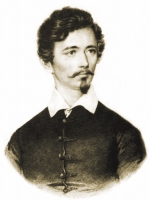| Petőfi Sándor | |||||
| péi duō fěi · shān duō 'ěr | |||||
| péi duō fěi · shān tuó 'ěr | |||||
| bǐ dé fěi | |||||
yuèdòupéi duō fěi Sándor Petöfizài诗海dezuòpǐn!!! | |||||
■在争取民族自由的斗争 环境中成长并为爱情讴歌
1823年1月1日,裴多菲·山陀尔生于奥地利帝国统治下的多瑙河畔的阿伏德平原上的一个匈牙利小城,父亲是一名贫苦的斯拉夫族屠户,母亲是马扎尔族的一名农奴。按照当时的法律他的家庭处在社会最底层。
一部分祖先来自中国汉代匈奴西迁部落的匈牙利,带有东西两种文化的激烈碰撞的特点,在欧洲历史上居于特殊地位。由于长期受到周边民族的歧视压迫,匈牙利人近千年来一直擅长用诗歌作为鼓励本民族战斗的号角,近代更涌现出一大批杰出的爱国诗人。17世纪以后,匈牙利又一直受奥地利帝国的统治而丧失了独立地位,争取自由的起义斗争此起彼伏。
生活在这种环境下的裴多菲,少年时代就愿意听老年人讲述民族英雄胡斯领导起义的传说。在小酒店和同伴谈论着当年匈牙利民族争取独立而斗争的故事,在他幼小的心灵上深深打下烙印。这种“自由论坛”的氛围,也极大地促进了裴多菲语言的发展和进步,很小的时候他就能用匈牙利语和斯洛伐克语自由交谈,拉丁语也有了一定的基础。
1835年,12岁的穷孩子裴多菲有机会到奥赛德求学,三年时间里他尽显了聪明才智,完成校方规定的课业外又组织起进步的学生团体,阅读和研究法国大革命的历史和匈牙利古典作家的作品。1838年,裴多菲写下了他的处女作讽刺诗《告别》。该诗继承发扬了匈牙利古典诗歌的传统,初步体现了他毕生所一直遵循的诗歌语言大众化的特点。他又当过兵,做过流浪演员,任过《佩斯时装报》的助理编辑,丰富的社会经历更深化了他创作的源泉。
1846年9月,23岁的裴多菲在舞会上结识了伊尔诺茨伯爵的女儿森德莱·尤丽娅。这位身材修长、有浅蓝色眼睛的美丽姑娘的清纯和率真,使年轻诗人一见倾心,拥有大量土地庄园的伯爵却不肯把女儿嫁给裴多菲这样的穷诗人。面对阻力,裴多菲对尤丽娅的情感仍不可抑制,在半年时间里发出了一首首情诗,如《致尤丽娅》、《我是一个怀有爱情的人》、《你爱的是春天》、《凄凉的秋风在树林中低语》、《一下子给我二十个吻吧》等。这些抒情诗中的珍品,鼓动尤丽娅冲破父亲和家庭的桎梏,在一年后同裴多菲走进了婚礼的殿堂。
此刻,欧洲大地已涌起革命洪流,匈牙利人民起义也如涌动的岩浆。蜜月中的裴多菲欢乐与忧郁交织。他不愿庸碌地沉溺于私家生活,写下了著名箴言诗《自由与爱情》:“生命诚可贵,爱情价更高……”这首名作,此后百年间一直是激励世界进步青年的动人诗句。
■以诗歌做号角 用满腔激情争取民族独立
1848年春,奥地利统治下的匈牙利民族矛盾与阶级矛盾已经达到白热化程度。裴多菲目睹人民遭受侵略和奴役,大声地疾呼:“难道我们要世代相传做奴隶吗?难道我们永远没有自由和平等吗?”诗人开始把理想同革命紧紧地连在了一起,决心依靠贫苦人民来战斗,并写下一系列语言凝练的小诗,作为鼓舞人们走向民族民主革命的号角。
3月14日,他与其他起义的领导者在佩斯的一家咖啡馆里议定起义事项,并通过了旨在实行资产阶级改革的政治纲领《十二条》,当晚,裴多菲便写下起义檄文《民族之歌》:
起来,匈牙利人,祖国正在召唤!
是时候了,现在干,还不算太晚!
愿意做自由人呢,还是做奴隶?
你们自己选择吧,就是这个问题!
15日清晨,震惊世界的“佩斯三月起义”开始了,1万多名起义者集中在民族博物馆前,裴多菲当众朗诵了他的《民族之歌》。起义者呼声雷动,迅速占领了布达佩斯,并使之成为当时的欧洲革命中心。翌年4月,匈牙利国会还通过独立宣言,建立共和国。恩格斯曾指出:“匈牙利是从三月革命时起在法律上和实际上都完全废除了农民封建义务的唯一国家。”
面对布达佩斯起义,决心维护欧洲旧有秩序的奥地利皇帝斐迪南马上联合俄国沙皇尼古拉一世,34万俄奥联军向着人口仅有500万的匈牙利凶狠地压来。民族危难时刻,裴多菲给最善战的将军贝姆去了一封信:“请让我与您一起去战场,当然,我仍将竭力用我的笔为祖国服务……”在1848这一战火纷飞的年份里,裴多菲写下了多达106首抒情诗。翌年1月,裴多菲成为一名少校军官,他写诗同时又直接拿起武器参加反抗俄奥联军的战斗。
■牺牲于哥萨克骑兵矛下 短暂的一生留下800多首诗歌
1849年夏,匈牙利革命军在强敌压迫下战至最后时刻。7月31日晨,贝姆将军将还能战斗的300人组成了一支骑兵队,在战斗打响前又特意叮嘱裴多菲留下。诗人却违背了将军的命令,跟在骑兵队后面出发。这些英勇的匈牙利战士与数倍的敌人胶着在一起时,很快便被淹没和融化了。身材削瘦的诗人也被两名俄国哥萨克骑兵前后围住,一柄弯刀凶狠地向他劈来,诗人闪身躲开,但同时另一把尖利的长矛已刺进了他的胸膛,诗人痛苦地倒下了……
此后的数十年里,匈牙利人民始终不愿相信他们的诗人已不在人世,传说不断出现。有人说曾在一个农民家里看见过他,有人称自己被俘后在俄国见过裴多菲。匈牙利议会还专门进行了调查,但令人失望的是,这个“目睹者”既没当过兵,更未被俘虏过……
经过匈牙利人民的反抗斗争,奥地利帝国被迫在1867年同匈牙利签订协定,承认在奥国皇帝为统一元首的前提下,可以建立二元化的联合国家政体,国名也改称奥匈帝国。一次世界大战结束时奥匈帝国崩溃,1918年末匈牙利实现了完全独立建国。
裴多菲牺牲时仅26岁,身后留下22岁的妻子和1岁半的幼子。他一生中写下了800多首抒情诗和8部长篇叙事诗,此外还有80多万字的小说、政论、戏剧和游记,且有相当部分在战火中完成。这样的高产率,在欧洲文学史上是非常罕见的。
在匈牙利文学乃至其整个民族的发展史上,裴多菲都占有独特的地位。他奠定了匈牙利民族文学的基石,继承和发展了启蒙运动文学的战斗传统,被人誉为“是在被奴隶的鲜血浸透了的、肥沃的黑土里生长出来的‘一朵带刺的玫瑰’”。一个多世纪以来,裴多菲作为争取民族解放和文学革命的一面旗帜,也得到了全世界进步人士的公认。他那一首首脍炙人口的诗篇,至今仍在广为传诵。
Early life
His birth certificate, written in Latin, gives his name as Alexander Petrovics. His father's first language was Hungarian. (According to many sources, he was of Serb descent and his original name was Stevan Petrović, while according to other sources, he was of Slovak descent ), and his mother was Mária Hrúzová (Hungarian: Hrúz Mária) who spoke only Slovak. However, he had a very strong self-awareness of being Hungarian, becoming the spiritual leader of the revolutionary radicals (who wanted full independence from the Habsburg Monarchy and a free Hungary). He wrote some of Hungary's greatest national poetry - from his poem, Nemzeti dal ("National Song"):
By the God of the Hungarians / We swear, / We swear, that we will be slaves / No longer! - (literal translation).
Petőfi's entry in the parish register (kept at the Kiskőrös Petőfi Museum)The family lived for a while in Szabadszállás, where his father owned a slaughterhouse. Within two years, the family moved to Kiskunfélegyháza, and Petőfi always viewed the city as his true birthplace. His father tried to give his son the best possible education, but when Sándor was 15 they lost their money due to the Danube floods of 1838 and the bankruptcy of a relative. Sándor had to leave the lyceum he attended in Selmecbánya (Banská Štiavnica). He had small jobs in various theatres in Pest, worked as a teacher in Ostffyasszonyfa and was a soldier in Sopron.
After a restless period of travelling Petőfi attended college at Pápa, where he met Mór Jókai, and a year later, in 1842, his poem A borozó ("The Pub") was first published in Athenaeum under the name Sándor Petrovics. On November 3 of the same year he published this poem, using the name "Petőfi" for the first time.
However, Petőfi was more interested in the theatre. In 1842 he joined a travelling theatre, but then had to leave it. He tried to keep himself financially afloat by writing for a newspaper, but that wasn't enough. Malnourished and sick, he arrived in Debrecen, where his friends helped him get back on his feet.
In 1844 he walked from Debrecen to Pest to find a publisher for his poems, in which he succeeded, and the poems were becoming increasingly popular. He relied on folkloric elements and popular, traditional song-like verses.
Among his longer works is the epic János Vitéz (1845, "Sir John", ISBN 1843910845). On the other hand, he felt he was forced into a folkish, wine-and-pubs, low-quality niche by his publisher, while in fact he also had an extensive Western-oriented education and revolutionary passions to write about. (Of course, these would be difficult to publish, due to the heavy censorship of the time).
In 1846, he met Júlia Szendrey in Transylvania, and they married the next year, against the will of her father, spending their honeymoon in the castle of Count Sándor Teleki, the only aristocrat among Petőfi's friends. Afterwards, he was even more possessed by thoughts of a global revolution. He moved to Pest and joined a group of like-minded students and intellectuals who regularly met at Café Pilvax. They worked at promoting Hungarian as a language of literature and theatre. (The first permanent theatre (the National Theatre) performing in Hungarian opened at this time.)
Sándor Petőfi in 1844
The Hungarian Revolution of 1848
March 15, 1848 was Petőfi's day. Among the various leaders of the revolution - called Márciusi Ifjak ("Youths of March") - Petőfi was the key in starting the revolution in Pest, co-author and, respectively, author of the two most important written documents: the 12 Pont (demands to the Habsburg Governor-General) and the Nemzeti Dal.
When the news of the revolution in Vienna reached them on the 15th, Petőfi and his friends decided to change the date of the "National Assembly" (a rally where a petition to the Hungarian noblemen's assembly would be approved by the people), from March 19th to the 15th. (This was a lucky decision, given that the authorities knew their plans, and intended to arrest the revolutionaries on the 18th.)
On the morning of the 15th, the revolutionaries wit Petőfi began to march around the city of Pest, reading the poem and the 12 points to the crowd (which swelled to thousands). Then, they visited printing presses, declaring an end to all forms of censorship and printing Petőfi's poem together with the 12 Pont. The mayor was forced by the crowds to sign the 12 Pont. Later, a mass demonstration was held in front of the newly-built National Museum, after which the group left for Buda on the other bank of the Danube. When the crowd rallied in front of the Imperial governing council, the representatives of Emperor Ferdinand felt they have no choice but to sign the 12 points. As one of the points was freedom for political prisoners, the crowd moved on to greet the newly freed revolutionary poet Mihály Táncsics.
Petőfi's popularity waned as the memory of the glorious day faded, and the revolution went the way of high politics: to the leadership of the nobles. Those in the noblemen's Assembly in Pozsony/Bratislava) had in fact been pushing for slower reforms at the same time - delivering a list of demands to the Emperor on the 13th - but events had overtaken them briefly. Petőfi disagreed with the Assembly, and criticised the way they saw the goals and methods of the Revolution. (His colleague Táncsics was imprisoned yet again by the new government.) In the general election, he ran in his native area, but did not get the seat. At this time, he wrote his most serious poem, the epic Az Apostol ("The Apostle", an epic about a fictional revolutionary who, after much suffering, attempts, but fails to assassinate a fictitious king.)
Petőfi joined Polish revolutionary general Józef Bem's Transylvanian army, fighting a successful campaign against Habsburg troops, Romanian and Transylvanian Saxon militias. However, it was defeated repeatedly when Imperial Russia intervened to aid the Austrians. He was last seen in the battle of Segesvár (Sighişoara), July 31, 1849. The circumstances of his death are mysterious.
The main opinion is that he died in the battle, based on the account of a Russian military doctor in his diary. He saw an unusual-looking corpse dead of a stomach lance wound, having Petőfi's characteristic yellowish face and matching clothing; Petőfi had the habit of wearing a civilian jacket with uniform trousers. Recently an ethnic Hungarian Romanian claimed to have located fragments of a stone eagle which local Hungarians are known to have erected in 1855 on the site of the mass grave where Petőfi was allegedly buried. Considering the number of fallen Hungarians in the battle of Segesvár, an excavation would not offer much hope, even if genetic material could be obtained from the graves of his parents. Some Hungarians, notably Ferenc Morvai, believe Petőfi was captured and taken to Russia, where he died some years later of natural causes.
After the Revolution was crushed, Petőfi's writing became immensely popular, while his rebelliousness served as a role model ever since for Hungarian revolutionaries and would-be revolutionaries of every political colour. Today, streets are named after him throughout Hungary (perhaps one in every village, but in Budapest there are 11) and in the Hungarian-inhabited areas of Transylvania, as well as a national radio station and a bridge in Budapest.
Poetry
Petőfi started his career as a poet with so-called "popular situation songs", to which his first published poem, A borozó ("The Winery", 1842), belongs. It is the song of a drinker praising the healing power of wine to drive away all troubles. This kind of pseudo-folk song was not unusual in Hungarian poetry of the 1840s, but Petőfi soon developed an original and fresh voice which made him stand out. He wrote many folk song-like poems on the subjects of wine, love, romantic robbers etc. Many of these early poems have become classics, for example the love poem A virágnak megtiltani nem lehet ("You Cannot Forbid the Flower", 1843), or Befordultam a konyhára ("I Turned into the Kitchen", 1843) which uses the ancient metaphor of love and fire in a playful and somewhat provocative way.
The influence of folk poetry and 19th-century populism is very significant in Petőfi's work, but other influences are also present: Petőfi drew on sources such as topoi of contemporary almanac-poetry in an inventive way, and was familiar with the works of major literary figures of his day, including Percy Bysshe Shelley, Pierre-Jean de Béranger and Heinrich Heine.
Petőfi's early poetry was often interpreted as some kind of role-playing, due to the broad range of situations and voices he created and used. Recent interpretations however call attention to the fact that in some sense all lyrical poetry can be understood as role-playing, which makes the category of "role-poems" (coined especially for Petőfi) superfluous. While using a variety of voices, Petőfi created a well-formed persona for himself: a jaunty, stubborn loner who loves wine, hates all kinds of limits and boundaries and is passionate in all he feels. In poems such as Jövendölés ("Prophecy", 1843) he imagines himself as someone who will die young after doing great things. This motif recurs in the revolutionary poetry of his later years.
The influence of contemporary almanac-poetry can be best seen in the poem cycle Cipruslombok Etelke sírjára ("Branches of Cypress for Etelke's Tomb", 1845). These sentimental poems, which are about death, grief, love, memory and loneliness were written after a love interest of Petőfi's, Etelke Csapó, died.
In the years 1844-45 Petőfi's poetry became more and more subtle and mature. New subjects appeared, such as landscape. His most influential landscape poem is Az Alföld ("The Plains"), in which he says that his homeland, the Hungarian plains are more beautiful and much dearer than the Carpathian mountains; it was to become the foundation of a long-lived fashion: that of the plains as the typical Hungarian landscape.
Petőfi's poetic skills solidified and broadened. He became a master of using different kinds of voices, for example his poem A régi, jó Gvadányi ("The Good Old Gvadányi") imitates the style of József Gvadányi, a Hungarian poet who lived at the end of the 18th century.
It's interesting to note that several of Petőfi's poems were set to music by the young Friedrich Nietzsche, who composed as a hobby while studying classics at Pforta before beginning his career in philosophy.
Monuments
Petőfi has a larger than life terra cotta statue near the Buda end of Erzsébet Bridge, sculpted by Miklós Izsó and Adolf Huszár.
References
^ B92 - Vesti - Na današnji dan, 31. jul - Internet, Radio i TV stanica; najnovije vesti iz Srbije
^ Sándor Petõfi
^ languagehat.com: Comment on THE FIRST LITHUANIAN BOOK
^ Élet és Irodalom
^ Igaz-e, hogy Petőfi édesapja szerb volt? - NATIONAL GEOGRAPHIC MAGYARORSZÁG
^ Magyar Életrajzi Lexikon 1000-1990




